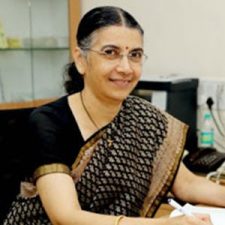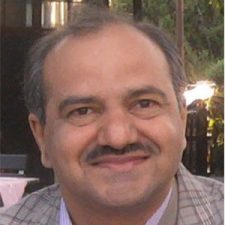Core Team

Dr. Smita Mahale
Former Director, Emeritus Scientist, ICMR-NIRRCH, Mumbai
Dr. Smita Mahale is a former Director & Emeritus Scientist, ICMR-NIRRCH, Mumbai. She holds PhD in Biochemistry from the University of Mumbai and conducted post-doctoral research at Wadsworth Center, New York State Department of Health, Albany, New York, USA. She is an elected fellow of National Academy of Sciences, India and Indian National Science Academy. Dr Mahale has working experience in the area of Reproductive Biology/Reproductive Endocrinology over the last 30 years. She has extensively worked on the structure-function of gonadotropins, their receptors and other proteins involved in reproduction. She is recipient of several awards including ICMR Swaran Kanta Dingley Award, Labhsetwar Award, Drs. Kunti & Om Prakash Oration Award and Prof. N. R. Moudgal Memorial Oration Award. She is providing mentoring support for the public health programs of National importance including snakebite, COVID-19.

Dr. Rahul Gajbhiye
Scientist E & DBT Wellcome India Alliance Clinical & Public Health Intermediate Fellow, ICMR-NIRRCH, Mumbai Maharashtra
Dr. Rahul Gajbhiye is a Clinician-Scientist, currently working at Indian Council of Medical Research (ICMR) – National Institute for Research in Reproductive Health (NIRRCH), Ministry of Health & Family Welfare, Government of India. He completed his medical school at Dr. Panjabrao Deshmukh Memorial Medical College, Amravati, Maharashtra State, India and obtained a Doctorate Degree in Applied Biology from University of Mumbai, India. He completed post-doctoral fellowship in reproductive genetics under the mentorship of Professor Grant Montgomery at the Institute of Molecular Biosciences, The University of Queensland, Australia.

Professor Grant Montgomery
Director, UQ Genome Innovation Hub, NHMRC Leadership Fellow, Institute for Molecular Bioscience (IMB), The University of Queensland, Australia
Professor Grant Montgomery completed his PhD in Animal Science at Massey University and post-doctoral fellowship in France. In 1987, he became the co-founder of the New Zealand Sheep Genomics Program in the Biochemistry Department at the University of Otago where he introduced genome mapping methods in farms animals. In 1999, he joined the Queensland Institute of Medical Research and established the genome mapping program for human complex diseases. Since 2016, Professor Montgomery has been working at the Institute for Molecular Bioscience (IMB), University of Queensland where he also holds joint appointments with the Queensland Brain Institute (QBI) and School of Public Health. He has received various awards and fellowships such as the National Health and Medical Research Council Principal Research Fellow and a Fellow of the Society for Reproductive Biology (2012), Fellow of the Australian Academy of Health and Medical Sciences (2015), and Honorary Fellow of the Royal Society of New Zealand (2016). Professor Montgomery is currently leading the charge in endometriosis research in Australia. His work has identified possible target genes and functional consequences of genetic risk factors in genomic regions associated with endometriosis providing novel insights into the causes of this complex disease. He is Patron of the Endometriosis Association (QLD) Inc (QENDO) and has worked closely with QENDO, other patient groups, clinicians and politicians to help develop the National Action Plan for Endometriosis. He is on the Executive Committee of the National Endometriosis Clinical and Scientific Trials (NECST) Network. Currently, he is exploring whether there could be sub-types of endometriosis, similar to many cancers, requiring different treatment options. He is also using genomic approaches to help understand environmental risk factors for endometriosis. Professor Montgomery is now a mentor to Dr. Rahul Gajbhiye, DBT Wellcome India Alliance Clinical & Public Health Intermediate Fellow. He is providing guidance and support to Dr. Rahul for data collection protocols and in acquiring advanced skills in genomic data analysis.

Professor Gita Mishra
Head of the Epidemiology and Biostatistics Division, Professor of Life Course Epidemiology School of Public Health, The University of Queensland, Australia
Professor Gita Mishra has been internationally recognized for her expertise in women’s health and life course epidemiology, especially the links between reproductive characteristics and non-communicable diseases (NCDs). She is currently Head of the Epidemiology and Biostatistics Division and Professor of Life Course Epidemiology at the School of Public Health, University of Queensland (UQ). She is also Director of the Australian Longitudinal Study of Women’s Health (ALSWH). Professor Mishra has received various awards and fellowships like the National Health and Medical Research Council Principal Research Fellowship (2018-2022), the prestigious ARC Future Fellowship (2013-2017) and Fellow of the Australian Academy of Health and Medical Sciences (FAHMS) (2017). She is an accredited Chartered Scientist (Science Council) and Chartered Statistician (UK, Royal Statistical Society). She was also awarded the honorary membership of Sigma International, a global nursing organisation, for her contribution to women’s health; and was elected as a board member for the European Menopause and Andropause Society (EMAS) (2017). Endometriosis is a key part of the ALSWH research programme, where Professor Mishra and group found a new figure on prevalence of endometriosis (1 in 9 women) in Australia. The findings highlighted the importance of accurate statistics and highly contributed in the National Action Plan on Endometriosis. Professor Mishra is now a Collaborator on DBT Wellcome Trust India Alliance project led by Dr. Rahul Gajbhiye. She has been providing advice and support to Dr. Gajbhiye on the protocol for selection of study participants, epidemiological data collection, quality control, adherence to International protocols and statistical analysis of the genomic data.

Professor Rajesh Dixit
Director, Center for Cancer Epidemiology, Tata Memorial Center, Mumbai, India
Professor Rajesh Dikshit is the Director, Centre for Cancer Epidemiology, Tata Memorial Centre, Mumbai, India. He holds a Ph.D degree in Epidemiology from the University of Tampere, Finland. He is the Principal Investigator for IARC Regional Hub for Cancer Registration in Central, Eastern and South Asia and is responsible for establishing cancer registries in many parts of India. He is establishing a cohort of 200,000 individuals at Barshi with development of automated bio-bank facility. He has about more than 70 publications in International journals including Lancet, Lancer Oncology, NEJM, British Journal of Cancer, International Journal of Cancer etc. He has edited and authored chapters in books, including in UICC Manual of Clinical Oncology. Professor Dikshit is providing advice and support to Dr. Gajbhiye on selection of study participants especially hospital
